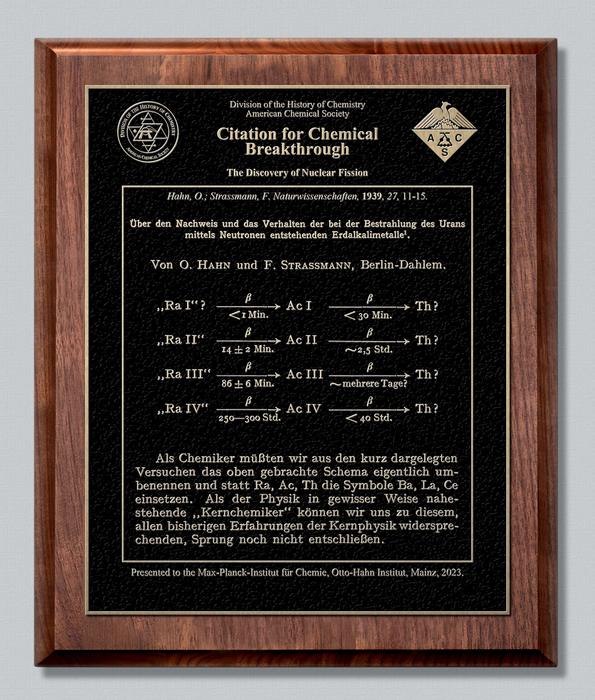Established in 2006 by historian of science and chemist Jeffrey I. Seeman, who then chaired the Division of the History of Chemistry (HIST) of the American Chemical Society, the Citation for Chemical Breakthrough Award celebrates breakthrough publications, books, and patents worldwide that have been revolutionary in concept, expansive in scope, and impactful in the long term. Seeman intended the award to “celebrate great scientific accomplishments and motivate through shared pride of achievement.”

Credit: American Chemical Society, Div. of the History of Chemistry
Established in 2006 by historian of science and chemist Jeffrey I. Seeman, who then chaired the Division of the History of Chemistry (HIST) of the American Chemical Society, the Citation for Chemical Breakthrough Award celebrates breakthrough publications, books, and patents worldwide that have been revolutionary in concept, expansive in scope, and impactful in the long term. Seeman intended the award to “celebrate great scientific accomplishments and motivate through shared pride of achievement.”
This recognition underscores the significance of the December 1938 discovery by Otto Hahn and Fritz Straßmann, where while bombarding uranium with neutrons, they uncovered the creation of fission products such as radioactive barium—a revelation that challenged established principles of nuclear physics. Seeking an explanation, Hahn immediately turned to his colleague and collaborator and nuclear physicist Lise Meitner, who, due to her Jewish heritage, had been forced to leave Germany earlier. Collaborating with her physicist nephew Otto Robert Frisch, Meitner provided the crucial explanation for the groundbreaking phenomenon of nuclear fission. Shortly after, in early January 1939, Hahn and Straßmann unveiled their findings in the article “Über den Nachweis und das Verhalten der bei der Bestrahlung des Urans mittels Neutronen entstehenden Erdalkalimetalle,” published in the journal “Naturwissenschaft.”
Since Meitner and Frisch published the physical explanation “Disintegration of Uranium by Neutrons: a New Type of Nuclear Reaction” in the research magazine Nature in February 1939 the Citation for Chemical Breakthrough Award 2023 was also awarded to The Royal Swedish Academy of Sciences, Stockholm, Sweden and the Niels Bohr Institute, University of Copenhagen, Denmark, where Meitner and Frisch, respectively, had worked on their paper.
Following up on the pioneering discovery, the 1944 Nobel Prize in Chemistry was awarded to Otto Hahn, who became the founding president of the Max Planck Society a few years later. The discovery of nuclear fission marked the beginning of a new era: the age of atomic energy with the potential to harness the energy stored in atomic nuclei, implying both opportunities and risks for humanity. Recently, the enrichment of nuclear fission products in sediments around the year 1950 has been proposed as a marker for the beginning of the Anthropocene, which the Institute’s latest Nobel Laureate Paul Crutzen discovered as a new geologic epoch characterized by the globally pervasive influence of humans on planet Earth.
The plaque bestowed by the Division of History of Chemistry of the American Chemical Society will be exhibited during an award ceremony at the Max Planck Institute for Chemistry in Mainz, also named Otto Hahn Institute, in early summer 2024 to commemorate the historical accomplishment.




